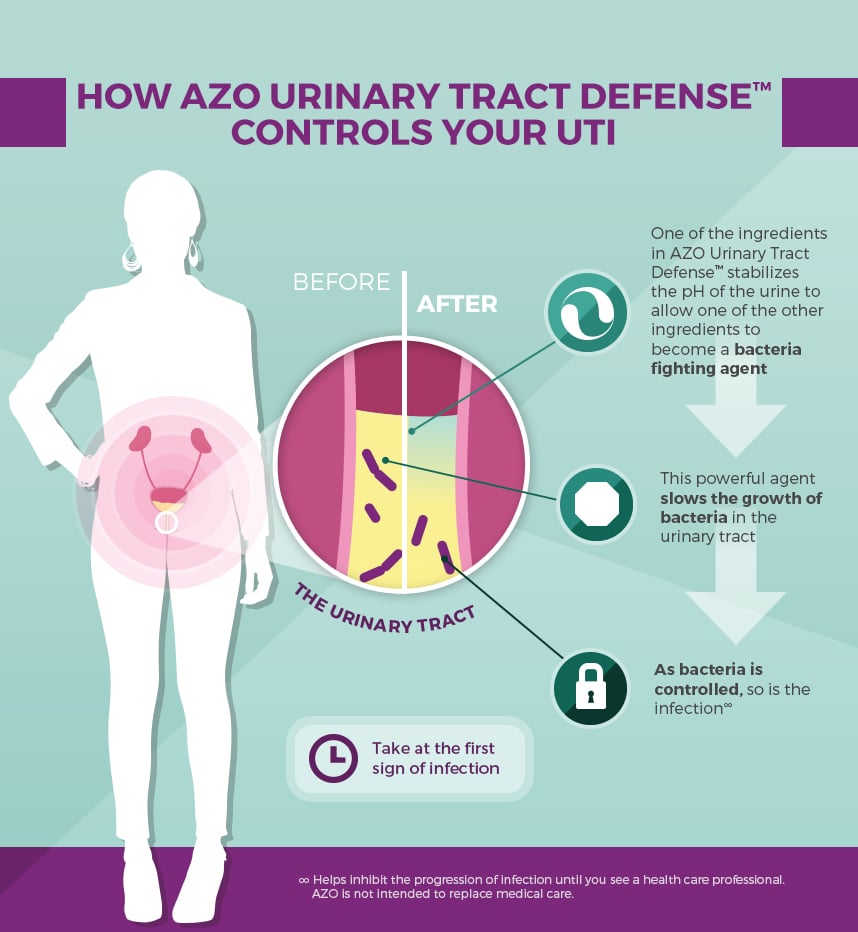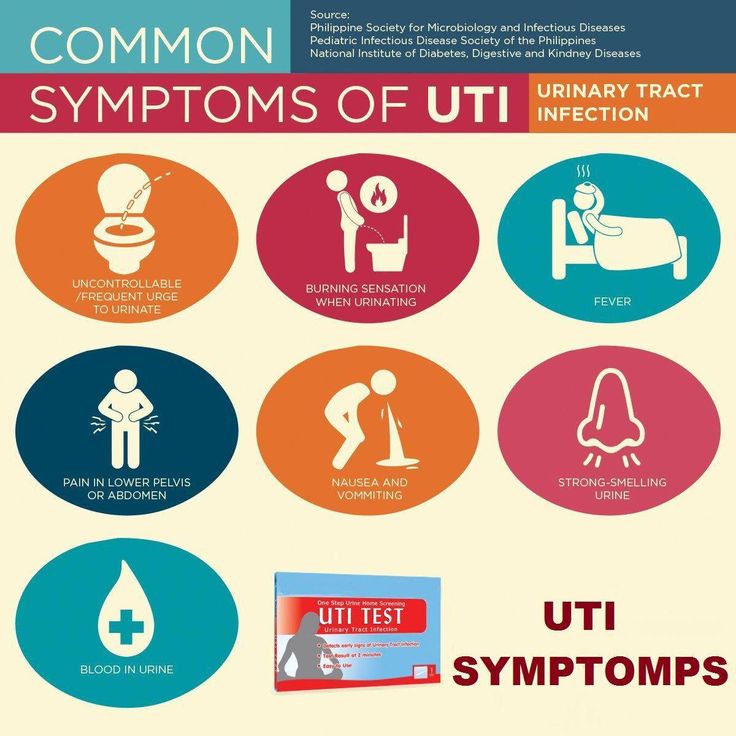Causes Of Utis And Bladder Infections
UTIs and bladder infections occur as a result of bacterial growth in your urinary tract. Your body is naturally home to billions of species of bacteria, and not all of them are bad.
In fact, bacteria help keep your body functioning the way its supposed to. But some bacteria dont belong in sensitive places in your body, and they can trigger some pretty miserable symptoms when they end up in the wrong place.
For example, E. coli, which is most commonly found in your digestive system, is also the most common type of bacteria to cause a UTI or bladder infection.
Several things can increase the risk of UTIs and bladder infections. While some of these risk factors are out of your control, you can control others.
- Sexual intercourse: As fun as sex is, it can increase the risk of developing UTIs. The friction and movement around your genital area during sexual activity can facilitate bacteria moving around down there.
- Hygiene: Things like forgetting to change your underwear, wiping from back to front, or sitting in wet or sweaty clothes for prolonged periods can up your chances of getting a UTI.
- Genetics: Some people are simply more prone to UTIs than others. If someone in your immediate family gets UTIs regularly, youre probably more susceptible to them too.
- Age: Due to urinary incontinence and estrogen deficiency, research shows that women are more likely to get recurrent UTIs after menopause.
How Can I Prevent Utis
If you have repeated UTIs, try these self-help measures to prevent recurring infections:
- Drink more fluids to help flush out bacteria.
- Urinate as soon as you feel the need.
- Urinate immediately after intercourse.
- Wear cotton underwear and loose-fitting pants.
- Find an alternative method of birth control if you use spermicides.
- Dont use perfumed soaps, talcum powder or deodorant around the genital area.
- Avoid constipation.
- Use lubricant gel with intercourse if the vaginal area is dry.
There is conflicting evidence for drinking cranberry juice to prevent UTIs. If you want to try cranberry products, ask your doctor for advice.
If infections are an ongoing problem, you may need to be referred to an urologist for further treatment.
When Should I See My Doctor
If you have any symptoms associated with a UTI or a pre-existing health condition, dont delay visiting your doctor for treatment.
UTIs can be more dangerous if youre pregnant, due to an increased risk of kidney involvement. See your doctor if you are pregnant and you think you have a UTI, even if your symptoms are mild.
Children with UTI symptoms should see a doctor, to check for a more serious underlying condition.
Bladder infections may spread to your kidneys . This is a serious infection and needs immediate treatment with antibiotics. Signs and symptoms of kidney infection include fever, back pain, diarrhoea and vomiting. If you have these symptoms, it is important to see your doctor.
Also Check: Can You Get Antibiotics For A Viral Infection
Treatment For A Uti Caused By E Coli
The first line of treatment for any bacterial infection is antibiotics.
- If your urinalysis comes back positive for germs, a doctor will likely prescribe one of several antibiotics that works to kill E. coli, since its the most common UTI culprit.
- If a urine culture finds a different germ is behind your infection, youll get switched to an antibiotic that targets that germ.
- You may also receive a prescription for a drug called pyridium, which helps reduce bladder pain.
- If you tend to get recurrent UTIs , you may need to be on low-dose antibiotics daily for a few months.
- Your doctor may also prescribe other medications for treatment that are not antibiotic based.
What Is Uti Medicine

Urinary tract infections are usually treated with prescription antibiotics. These are medicines that help kill the bacteria causing the infection or stop bacteria from multiplying. The length of antibiotic treatment depends on factors such as symptom severity, length of infection and if you have previously had a UTI. Be sure to carefully follow your healthcare providers instructions when taking prescribed antibiotics to treat a UTI.
Read Also: What Antibiotics Are Used For Infected Tooth
Eating Diet & Nutrition
Experts dont think eating, diet, and nutrition play a role in preventing or treating bladder infections. If you have any type of UTI, talk with a health care professional about how much to drink each day to help prevent or relieve your infection.
The National Institute of Diabetes and Digestive and Kidney Diseases and other components of the National Institutes of Health conduct and support research into many diseases and conditions.
Recommendations For Uti Prevention
To prevent urinary tract infection, some research suggests that the following may be helpful:
- Increasing fluid intake: The doctor may recommend increased fluid intake to help flush bacteria out of the urinary system.
- Drinking cranberry juice: Drinking 8 ounces of cranberry juice a day may help prevent recurrent UTIs. People who take blood thinners such as warfarin or are prone to kidney stones should check with a physician before trying this approach.
- Proper hygiene: Regular bathing keeps the genital area bacteria free, and women should wipe front-to-back after using the bathroom so as to avoid introducing bacteria into the urethra.
Recommended Reading: Wisdom Teeth Infection After Removal
A Pharmacist Can Help With Utis
You can ask a pharmacist about treatments for a UTI.
A pharmacist can:
- offer advice on things that can help you get better
- suggest the best painkiller to take
- tell you if you need to see a GP about your symptoms
Some pharmacies offer a UTI management service. They may be able to give antibiotics if they’re needed.
How Long Does A Uti Last
Urinary tract infections usually go away after the first few days of antibiotics treatment. Depending on the severity of the infection, they may last a bit longer. If you often get UTIs, your healthcare provider may prescribe low-dose antibiotics for a few months at a time. If you have a UTI, over-the-counter products may help ease your symptoms while you receive antibiotic treatment.
Recommended Reading: Antibiotic Shot For Ear Infection
Will I Need An Intravenous Antibiotic For A Uti
If you are pregnant, have a high fever, or cannot keep food and fluids down, your doctor may admit you to the hospital so you can have treatment with intravenous antibiotics for a complicated UTI. You may return home and continue with oral antibiotics when your infection starts to improve.
In areas with fluoroquinolone resistance exceeding 10%, in patients with more severe pyelonephritis, those with a complicated UTI who have allergies to fluoroquinolones, or are unable to tolerate the drug class, intravenous therapy with an agent such as ceftriaxone, or an aminoglycoside, such as gentamicin or tobramycin, may be appropriate. Your ongoing treatment should be based on susceptibility data received from the laboratory.
When To See A Doctor
Although the body may sometimes fight off a UTI on its own, waiting for this to happen carries risks. UTIs can quickly spread, causing serious kidney infections.
A person should see a doctor for any symptoms of a UTI, particularly if they are pregnant or have an underlying health condition that affects their immune system.
A person with should go to the emergency room for immediate medical care. The symptoms of a kidney infection include:
Also Check: What Opportunistic Infections Are Associated With Aids
Antibiotics Used For Uncomplicated Utis
If you are a healthy individual whose urinary tract is anatomically and functionally normal and you have no known heightened UTI susceptibility youve got whats dubbed an uncomplicated UTI, according to guidelines published in August 2019 in the Journal of Urology. For these individuals, antibiotics are considered the first-line of treatment.
The type of antibiotics you are prescribed and for how long is contingent on the type of bacteria detected in your urine, your current health status, and whether your UTI is uncomplicated or complicated. Depending on which antibiotic your doctor prescribes, women may need a single dose or up to a five-day course. For men, antibiotics are usually given for a slightly longer period of time, notes UpToDate.
Typically, if you are diagnosed with an uncomplicated UTI, one of the following will be prescribed as first-line treatment:
The following antibiotics are considered second-line treatments for UTI. They are generally chosen because of resistance patterns or allergy considerations:
RELATED: The Connection Between E. Coli and UTIs
Can Urinary Tract Infections Be Prevented

These steps may help reduce the chance of getting UTIs:
- Drink plenty of water every day.
- Drink cranberry juice. Large amounts of vitamin C limit the growth of some bacteria by acidifying the urine. Vitamin C supplements have the same effect.
- Urinate when you feel the need. Do not wait.
- Take showers instead of tub baths.
- Clean the genital area before and after sex, and urinate shortly after sex.
- Women should not use feminine hygiene sprays or scented douches.
- Cotton underwear and loose fitting clothes help keep the area around the urethra dry. Tight clothes and nylon underwear trap moisture. This can help bacteria grow.
- Repeated bouts of urinary tract infections can be treated with small doses of regular antibiotics.
Please consult your health care provider with any questions or concerns you may have about UTIs.
Read Also: Can I Get A Kidney Infection Without A Uti
What Is The Urinary Tract
The urinary tract makes and stores urine, one of the body’s liquid waste products. The urinary tract includes the following parts:
- Kidneys: These small organs are located on back of your body, just above the hips. They are the filters of your body removing waste and water from your blood. This waste becomes urine.
- Ureters: The ureters are thin tubes that carry urine from the kidneys to your bladder.
- Bladder: A sac-like container, the bladder stores your urine before it leaves the body.
- Urethra: This tube carries the urine from your bladder to the outside of the body.
About Urinary Tract Infections
Urinary tract infections are common infections that can affect the bladder, the kidneys and the tubes connected to them.
Anyone can get them, but they’re particularly common in women. Some women experience them regularly .
UTIs can be painful and uncomfortable, but usually pass within a few days and can be easily treated with antibiotics.
This page is about UTIs in adults. There is a separate article about UTIs in children.
This page covers:
Read Also: Is Zpack Good For Tooth Infection
What About Cranberry Juice For Uti
Its a long-held belief that consuming cranberry juice may help prevent and treat urinary tract infections. While its true that cranberries contain an active ingredient that can prevent adherence of bacteria to the urinary tract, there is still no evidence that cranberry products can treat a UTI.
One of the reasons: Products like cranberry juice or cranberry capsules are not explicitly formulated with the same amount of PACs that have shown potential in lab studies. Moreover, a 2019 report in the Journal of Urology noted that the availability of such products to the public is a severe limitation to the use of cranberries for UTI prophylaxis outside the research setting.
In all, theres actually very little high-quality research on the topic of prevention. For instance, a 2016 study in The Journal of the American Medical Association, found that among female nursing home residents, daily consumption of cranberry capsules resulted in no significant prevention of UTIs.
While consuming cranberry juice or supplements is not considered a first-line treatment of urinary tract infections, in most cases, it cant hurt. After all, drinking plenty of liquids does dilute your urine and help spur more frequent urination, which flushes bacteria from the urinary tract. The exception: Those who are taking blood-thinning medication, such as warfarin, should not consume cranberry juice. And those with diabetes should be mindful of the high-sugar content of fruit juices.
Drink Plenty Of Fluids
Dehydration is linked to an increased risk of UTIs.
This is because regular urination can help flush bacteria from the urinary tract to prevent infection. When youre dehydrated, you arent urinating as often, which can create a breeding ground for bacteria.
A examined nursing home residents and administered a drinking schedule to participants to increase their fluid intake. Following the schedule decreased UTIs requiring antibiotics by 56%.
In a 2020 randomized control trial , 140 premenopausal participants prone to UTIs took part in a 12-month study to test if a higher fluid intake would decrease their risk of recurrent cystitis and, in turn, their risk of developing a UTI. Researchers found that an increase in fluid intake led to a decrease in UTI frequency.
To stay hydrated and meet your fluid needs, its best to drink water throughout the day and always when youre thirsty.
Benefits of drinking more fluids for UTI
Drinking plenty of liquids can decrease your risk of UTIs by making you pee more, which helps remove bacteria from your urinary tract.
evidence suggests that increasing your intake of vitamin C could protect against UTIs.
Vitamin C is thought to work by increasing the acidity of urine, killing off the bacteria that cause infection.
An older 2007 study of UTIs in pregnant women looked at the effects of taking 100 milligrams of vitamin C every day.
Fruits and vegetables are especially high in vitamin C and are a good way to increase your intake.
Read Also: Diflucan 1 Dose Yeast Infection
Are There Natural At
Yes. While taking antibiotics is still considered the gold standard of UTI treatments, there are some things you can do at home that help relieve symptoms, as well. These include:
- Drink plenty of water. Consuming at least six to eight 8-ounce glasses of water daily can help flush away UTI-causing bacteria, setting you up for a quicker recovery. Plus, the more you drink, the more youll have to urinate.
- Urinate often. Each time you empty your bladder, youre helping to flush bacteria out of your system.
- Try heat. Applying a heating pad to your pubic area for 15 minutes at a time can help soothe the pressure and pain caused by UTI-related inflammation and irritation.
- Tweak your wardrobe. Wearing loose cotton clothing and underwear can help you recover from a UTI.
- Go fragrance-free. Make sure your personal hygiene products are fragrance-free to sidestep further irritation, notes the National Institute of Diabetes and Digestive and Kidney Diseases.
- Cut out certain irritants. Caffeine, alcohol, spicy food, raw onions, citrus fruits, carbonated drinks, artificial sweeteners, and nicotine can further irritate your bladder, making it more difficult for your body to heal, per the Cleveland Clinic.
RELATED: 8 Home Remedies for Urinary Tract Infections Symptoms
How Are Utis Treated
Treatments for UTIs often depend on the severity of the infection. Doctors often divide UTIs into simple and complicated infections.
Bladder infections usually fall into the simple category. Doctors can usually treat them with antibiotics over the course of three to five days. Common antibiotics used to treat bladder infections include trimethoprim, ciprofloxacin, and amoxicillin-clavulanate potassium.
If you have an infection, you should always take all of your antibiotics, even if you feel better. This keeps the infection from coming back.
Complicated UTIs are harder to treat. Kidney infections usually fall into this category. If you have a complicated UTI, you may require IV antibiotics and have to take antibiotics for a week or more.
Recommended Reading: Can Ketoconazole Treat Yeast Infection
How Are Urinary Tract Infections Treated
You will need to treat a urinary tract infection. Antibiotics are medicines that kill bacteria and fight an infection. Antibiotics are typically used to treat urinary tract infections. Your healthcare provider will pick a drug that best treats the particular bacteria thats causing your infection. Some commonly used antibiotics can include:
- Nitrofurantoin.
Its very important that you follow your healthcare providers directions for taking the medicine. Dont stop taking the antibiotic because your symptoms go away and you start feeling better. If the infection is not treated completely with the full course of antibiotics, it can return.
If you have a history of frequent urinary tract infections, you may be given a prescription for antibiotics that you would take at the first onset of symptoms. Other patients may be given antibiotics to take every day, every other day, or after sexual intercourse to prevent the infection. Talk to your healthcare provider about the best treatment option for you if you have a history of frequent UTIs.
What About Antibiotic Resistance

Resistance rates for antibiotics are always variable based on local patterns in the community and specific risk factors for patients, such as recent antibiotic use, hospital stay or travel. If you have taken an antibiotic in the last 3 months or traveled internationally, be sure to tell your doctor.
High rates of antibiotic resistance are being seen with both ampicillin and amoxicillin for cystitis , although amoxicillin/clavulanate may still be an option. Other oral treatments with reported increasing rates of resistance include sulfamethoxazole and trimethoprim and the fluoroquinolones. Resistance rates for the oral cephalosporins and amoxicillin/clavulanate are still usually less than 10 percent.
Always finish taking your entire course of antibiotic unless your doctor tells you to stop. Keep taking your antibiotic even if you feel better and you think you don’t need your antibiotic anymore.
If you stop your treatment early, your infection may return quickly and you can develop resistance to the antibiotic you were using previously. Your antibiotic may not work as well the next time you use it.
Don’t Miss: Epsom Salt Bath For Bladder Infection